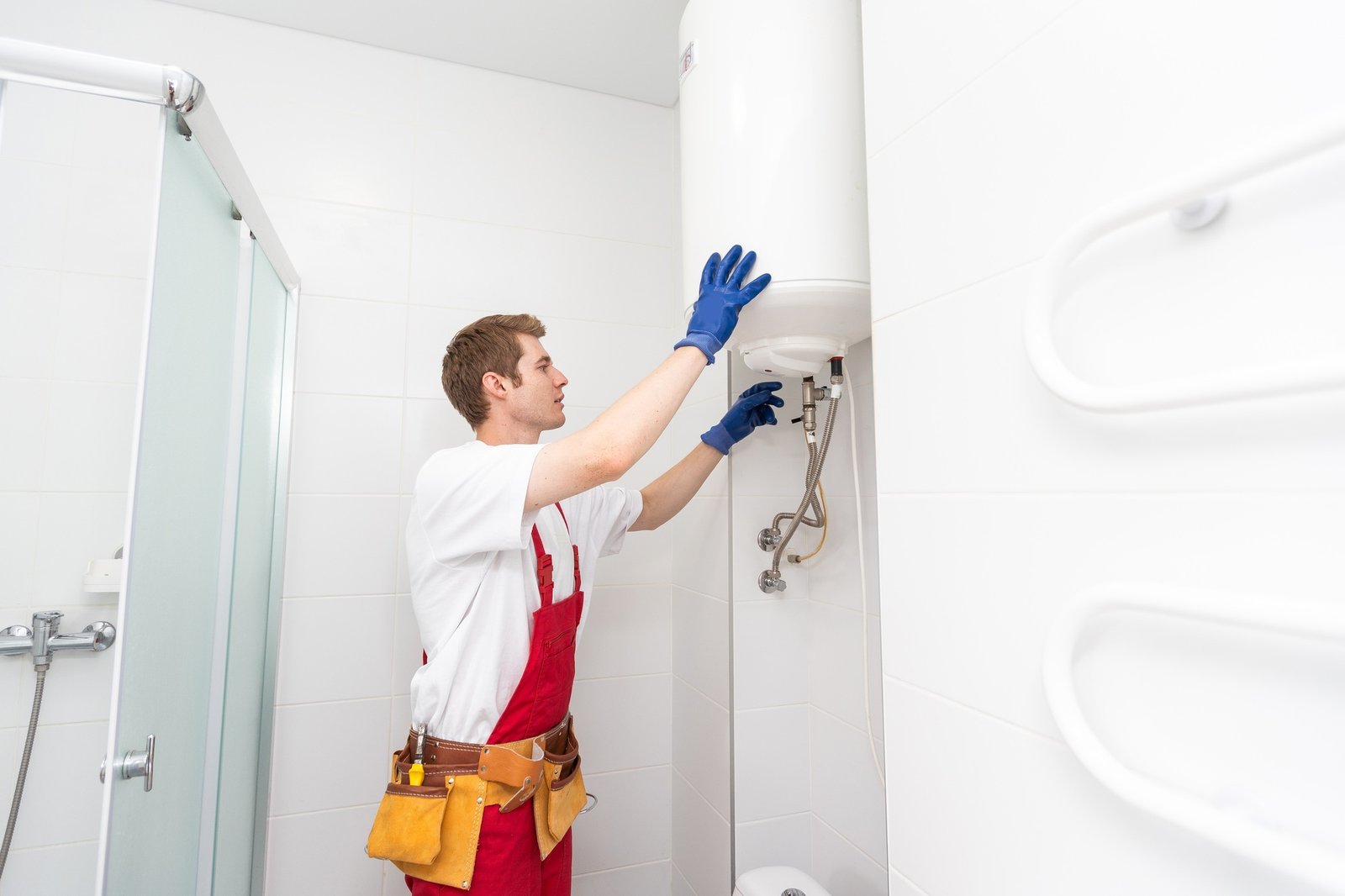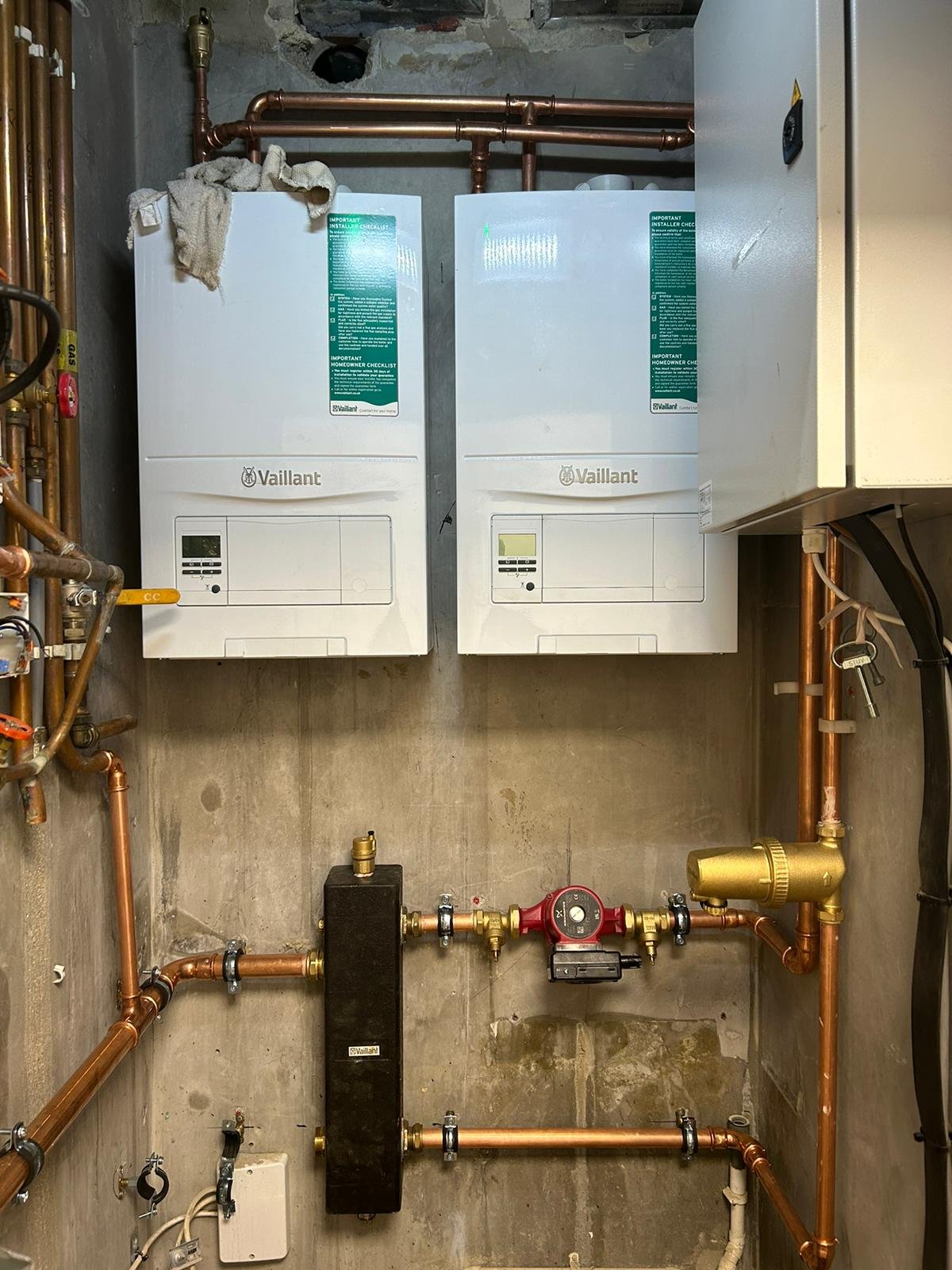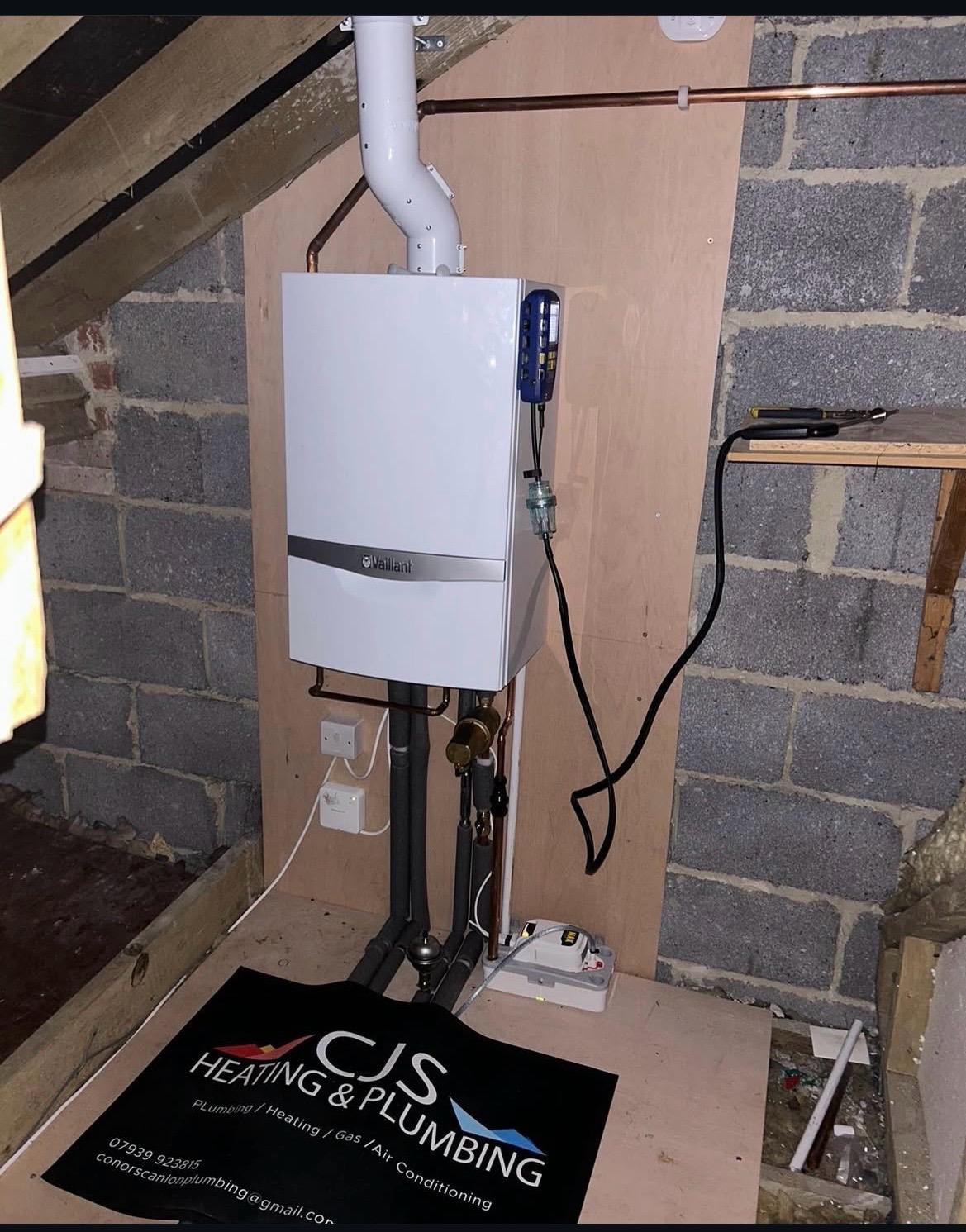Detecting boiler failure early is crucial for maintaining safety, comfort, and efficiency in your home. In the UK, where gas boilers are the most common heating systems, ensuring that your appliance operates safely and efficiently isn’t just about convenience , it’s also about compliance. Homeowners must ensure their systems are serviced by Gas Safe registered engineers and follow building regulations to prevent hazards like gas leaks or carbon monoxide exposure. Recognising early warning signs of boiler trouble can save you from costly breakdowns and help maintain consistent hot water and heating all year round.
If you suspect a fault or need expert support, you can contact CJS Heating & Plumbing for fast, professional help.
Common Boiler Types in the UK
The UK typically uses three main types of boilers:
- Combi boilers – Compact and energy-efficient, ideal for smaller homes. They provide both heating and hot water on demand without a storage tank.
- System boilers – Suitable for medium to large homes, using a cylinder to store hot water and ensuring a constant supply to multiple taps.
- Regular boilers – Also known as traditional or conventional boilers, these use both a cylinder and a cold-water tank. They’re best for properties with older heating systems or high water demands.
Each type has unique benefits, but all require regular servicing to ensure longevity and efficiency.
How a Boiler Works
A modern boiler operates through several core components working together:
- The burner ignites the gas or oil to create heat.
- This heat transfers to water through the heat exchanger.
- The pump circulates the heated water throughout the home.
- Valves regulate flow and pressure, while controls manage temperature and timing.
If any of these parts malfunction, your system’s efficiency drops , often the first sign of potential failure. Keeping an eye on boiler pressure, for example, can help you identify issues before they escalate.
Lifespan, Maintenance, and Efficiency
Most boilers have a lifespan of 10 to 15 years, depending on make, usage, and maintenance. Annual servicing by a Gas Safe engineer helps maintain performance and safety. Newer models meet high ErP efficiency standards, ensuring lower energy consumption and reduced carbon emissions.
Regular maintenance tasks include checking the pilot light, inspecting seals and wiring, and ensuring the condensate pipe isn’t blocked , especially during cold weather, when freezing can halt operation completely.
Why Boilers Fail
Boilers fail for a variety of reasons:
- Corrosion – Internal rusting can damage key components.
- Limescale and sludge buildup – Especially in hard water areas, this can reduce efficiency and overheat the system.
- Pressure issues – Both high and low boiler pressure can cause leaks or complete shutdowns.
- Component wear – Over time, pumps, valves, and fans degrade, leading to faults or system failure.
Early detection is key. If you notice strange noises, inconsistent heating, or a loss of hot water, it’s time to have your boiler inspected by a professional.
At CJS Heating & Plumbing, we understand how disruptive boiler problems can be. Don’t wait for a complete breakdown. Book your service today and keep your home running efficiently all year round.
Early Warning Signs of Boiler Failure
A well-functioning boiler keeps your home comfortable and your water consistently warm. But when issues begin to surface, they often start subtly, long before a complete boiler breakdown occurs. Spotting these early warning signs of boiler failure allows you to act quickly, preventing expensive repairs and keeping your central heating system safe and efficient. Below are key indicators that your boiler may be in trouble and what each one could mean.
Unusual Noises (Kettling, Banging, Gurgling, Whistling)
A healthy boiler should run quietly. If you hear banging, clanging, or whistling, it’s not something to ignore.
- Kettling noises (like a boiling kettle) often point to limescale buildup or sludge restricting water flow in the heat exchanger.
- Banging or knocking may suggest trapped air, loose pipes, or a failing pump.
- Gurgling can occur when air or debris is trapped in the system, reducing heating efficiency.
Over time, these sounds can worsen, indicating internal stress or pressure issues. Having the system flushed or descaled can often resolve these noises before they cause lasting damage.
Fluctuating Heating or Hot Water (Uneven Radiators, Cold Spots)
If your radiators heat unevenly, or if your water temperature keeps changing without reason, this signals poor circulation or internal blockage.
- Cold spots on radiators often mean there’s trapped air or sludge preventing heat from spreading evenly.
- Inconsistent hot water may indicate a failing diverter valve or low water pressure.
Inconsistent heating can make your home uncomfortable and force the boiler to work harder, leading to faster wear and tear.
Rising Energy Bills Despite Same Usage
If your energy bills are increasing without any change in your usage habits, your boiler may be losing efficiency. As parts become dirty, blocked, or worn out, the boiler must use more energy to maintain the same temperature. This not only wastes energy but can also accelerate mechanical failures.
To improve efficiency:
- Schedule an annual service to clean and recalibrate your boiler.
- Bleed your radiators to remove trapped air.
- Check for drafts and improve insulation to reduce strain on your heating system.
Frequent Breakdowns or Error Codes
Seeing repeated error codes or dealing with frequent system resets is a clear signal that your boiler needs professional attention. These codes are the boiler’s way of communicating what’s wrong, such as ignition issues, fan faults, or pressure imbalances.
If you find yourself calling for repairs often, it’s best to have an engineer perform a full diagnostic. Temporary fixes may keep your system running for now, but recurring problems usually point to deeper faults that can lead to total boiler failure if ignored.
Leaks or Damp Patches Near the Boiler
Water leaks are never normal and can quickly cause both system and property damage.
- Minor drips might come from worn washers or loose joints.
- Larger leaks could indicate corrosion in the pipes or heat exchanger.
- Damp patches or puddles near the boiler can lead to mould and structural issues.
Even a small leak reduces pressure, forcing your boiler to work harder to maintain performance. Always call a professional to inspect and repair leaks promptly.
Yellow or Flickering Pilot Light / Flame Colour Change
The flame inside your boiler should always burn blue. If it turns yellow, orange, or begins flickering, your boiler could be burning fuel inefficiently or producing carbon monoxide, a serious safety hazard. Turn off your boiler immediately, ventilate the area, and contact a Gas Safe registered engineer. Never attempt to fix this yourself.
Loss of Pressure or Inability to Maintain Pressure
Your boiler’s pressure gauge is a simple but vital indicator of its health.
- The pressure should generally remain between 1 and 2 bars when the system is cool.
- If the pressure drops frequently, there could be a leak, a faulty pressure relief valve, or an expansion vessel issue.
Low pressure affects heating performance, while high pressure can stress components and cause leaks.
Smells (Gas Smell, Burning Odour) or Soot / Black Marks
Strange smells around your boiler are never a good sign.
- A gas smell suggests a possible leak, turn off the system and call your gas supplier immediately.
- A burning odour can indicate overheating or an electrical fault.
- Soot or black marks near the boiler may point to incomplete combustion or blocked flues.
All of these signs require immediate professional inspection to prevent potential danger.
Excessive Condensation or Steam / Venting Issues
A small amount of steam from the flue is normal, but excessive condensation or visible water around the unit indicates venting or drainage issues. This may stem from blocked pipes, poor insulation, or a malfunctioning condensate trap. Fixing ventilation problems early helps maintain efficiency and prevents long-term corrosion.
When Warning Signs Turn into Failure, What to Do Next
Even a well-maintained boiler can develop issues over time. A small boiler fault may start as a minor inconvenience but can quickly escalate into a complete breakdown if left unchecked. Knowing what to do when early warning signs turn into failure can help you prevent expensive repairs, protect your home, and ensure your heating system operates safely.
Diagnosing vs. DIY: What You Can Safely Check
Before calling for help, there are a few simple checks homeowners can perform to determine whether the issue is minor. Start by inspecting your pressure gauge, if it’s too low or too high, your boiler may not work properly. Resetting the system or bleeding a radiator can sometimes resolve minor heating issues. You can also check if there’s a frozen condensate pipe during cold weather, which is a common cause of sudden boiler shutdowns.
However, it’s crucial to know where to draw the line. Beyond these small checks, you should never attempt to dismantle or repair components on your own. Boilers involve gas and electrical systems that require professional attention.
When to Call a Gas Safe Registered Engineer
If you’ve performed basic checks and the problem persists, it’s time to contact a Gas Safe registered engineer. In the UK, only qualified professionals can legally work on gas boilers, as improper handling can lead to serious safety risks.
Your engineer will carry out a full inspection, checking key components such as combustion levels, the flue, valves, seals, and control systems. They’ll also identify any fault codes displayed on your boiler, which can help pinpoint the cause of the malfunction quickly and accurately.
Repair vs. Replacement: Making the Right Decision
Once the issue has been diagnosed, your engineer will recommend either a repair or a replacement. A repair is often sufficient for newer boilers with isolated issues. However, if your boiler is older, frequently breaks down, or uses outdated parts, replacement may be the more practical choice. A new, energy-efficient model can help you save money on fuel and reduce future maintenance costs.
When considering repair versus replacement, think about the long-term value. While repairs may seem cheaper upfront, constant callouts can add up. On the other hand, replacing your boiler can improve reliability and efficiency, especially if your system is over ten years old.
Cost Considerations and Budgeting
The cost of fixing a boiler can vary depending on the nature of the fault, the price of replacement parts, and labor rates. Always ask for a clear estimate before work begins. Regular boiler service can also help you budget better by preventing unexpected breakdowns and extending your boiler’s lifespan.
Safety Risks and Precautionary Steps
One of the most critical reasons to act quickly is safety. Faulty boilers can pose a serious risk of carbon monoxide leaks, which are odorless and potentially deadly. To stay safe, ensure your home has a working carbon monoxide detector and proper ventilation. If you suspect a gas leak or smell gas, turn off your supply immediately, ventilate the area, and call emergency services.
Preventive Measures & Maintenance to Avoid Boiler Failure
A well-maintained boiler is the heart of a comfortable and efficient home, especially during the UK’s colder months. Regular maintenance and preventive care can drastically reduce the risk of unexpected breakdowns, costly repairs, or even safety hazards. Taking the time to understand how to properly maintain your boiler not only improves performance but also extends its lifespan, ensuring that you get the best return on your investment.
Recommended UK Servicing Frequency and Legal Obligations
In the UK, homeowners are strongly advised to have their boilers serviced at least once a year by a Gas Safe registered engineer. For landlords, this is not just a recommendation but a legal obligation, an annual gas safety check must be carried out for every rental property. Regular servicing ensures that your boiler operates within safe parameters and complies with national safety standards.
A professional service can help spot early warning signs of potential issues before they escalate into costly failures. For instance, unusual noises, inconsistent heating, or minor leaks often indicate internal wear or damage that needs prompt attention.
Boiler Servicing Checklist
A comprehensive boiler service covers several critical checks that ensure efficiency and safety:
- Flue Inspection: The engineer checks for obstructions or leaks in the flue system to make sure exhaust gases are vented safely.
- Heat Exchanger Cleaning: Cleaning the heat exchanger helps maintain efficient heat transfer and reduces energy waste.
- Sealing and Pressure Tests: The boiler’s seals are inspected for leaks, and system pressure is tested to confirm stable operation.
- Safety Device Check: Every safety component, including the thermostat and pressure relief valve, is tested to confirm proper functionality.
Catching a boiler error early during routine maintenance can save you from unexpected breakdowns in winter.
Tips for Year-Round Care
Consistent care between professional services can go a long way toward preventing problems:
- Insulate Your Pipes: Prevent a frozen condensate pipe during freezing temperatures by wrapping it with insulation sleeves.
- Check for Leaks and Corrosion: Small leaks or signs of rust can quickly worsen if ignored.
- Keep Air Vents Clear: Ensure vents and flues are unobstructed for safe air circulation and efficient combustion.
- Run the Boiler Occasionally in Summer: This prevents internal components from seizing up during long periods of inactivity.
Upgrades and Smart Control Options
Modernising your system with smart thermostats or smart boiler controls can significantly reduce strain on your boiler. These systems monitor usage patterns and maintain steady, efficient heating without overworking the unit. Some even alert you to boiler fault codes, helping you catch issues before they turn into major repairs.
Upgrading to an energy-efficient boiler or adding advanced controls can also lower your energy bills and reduce your home’s carbon footprint.
When to Plan for Replacement
Even with perfect maintenance, boilers have a limited lifespan. If your system is over 12–15 years old, showing frequent faults, or struggling to meet heating demands, it may be time to plan a replacement. Replacement is often more cost-effective than repeatedly repairing an aging system, especially when spare parts become hard to find or expensive.
Look for models that carry the latest energy efficiency ratings and are approved by the Energy Saving Trust.
Resources in the UK
If you’re unsure where to start, several trusted UK resources can help:
- Gas Safe Register – Verify your engineer’s qualifications and safety credentials.
- Energy Saving Trust – Learn more about efficient heating solutions and energy-saving grants.
- Government Grants – Check for boiler upgrade schemes or home heating grants that may reduce installation costs.
Keep Your Boiler in Top Shape
Staying on top of your boiler maintenance doesn’t have to be stressful. With CJS Heating & Plumbing, you get a reliable team that handles everything, from boiler installations, repairs, and servicing to emergency plumbing and full heating system maintenance. Whether it’s for your home, business, or industrial space, we make sure your system runs safely and efficiently so you can stay warm without the hassle.
If you’ve spotted any warning signs or just want a professional check-up, reach out today. You can call us at 07939 923815 or email info@cjs-heatingandplumbing.co.uk to book your service. Let the experts at CJS Heating & Plumbing help you prevent breakdowns, save energy, and keep your property comfortable all year round.





